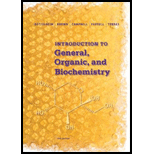
Concept explainers
(a)
Interpretation:
The IUPAC name of given structures should be determined.
Concept Introduction:
The International Union of Pure and Applied Chemistry have created a set of guidelines that are used for giving systematic name to chemical compound. This process of nomenclature is acceptable everywhere and there are rules provided to give name of chemical compounds. This nomenclature has some basic points like, parent carbon chain,
(b)
Interpretation:
The IUPAC name of given structures should be determined.
Concept Introduction:
The International Union of Pure and Applied Chemistry have created a set of guidelines that are used for giving systematic name to chemical compound. This process of nomenclature is acceptable everywhere and there are rules provided to give name of chemical compounds. This nomenclature has some basic points like, parenteral carbon chain, functional groups position, alphabetical order etc. taken into consideration.
(c)
Interpretation:
The IUPAC name of given structures should be determined.
Concept Introduction:
The International Union of Pure and Applied Chemistry have created a set of guidelines that are used for giving systematic name to chemical compound. This process of nomenclature is acceptable everywhere and there are rules provided to give name of chemical compounds. This nomenclature has some basic points like, parenteral carbon chain, functional groups position, alphabetical order etc. taken into consideration.
Want to see the full answer?
Check out a sample textbook solution
Chapter 13 Solutions
Introduction to General, Organic and Biochemistry
- Problem 11-4 Write the molecular formula and IUPAC name for each alkane.arrow_forwardProblem 16-1 How many hydrogen atoms does pyrrolidine have? How many does purine have? Write the xnolecular formula of each amine.arrow_forwardDraw the indicated number of resonance forms for each of the following species: (a) The methyl phosphate anion, CH3OPO32- (3) (b) The nitrate anion, NO3- (3) (c) The allyl cation, H2C=CH—CH2+ (2) (d) The benzoate anion (4)arrow_forward
- Problem 12-5 How many stereoisomers are possible for the following unsaturated alcohol? ch3 ch3 ch3 ch3c=chch2ch2c=chch2ch2c=chch2oharrow_forwardProblem 12-3 Write the IUPAC name for each cycloalkene.arrow_forwardProblem 17-7 Identify all hemiacetals and acetals in the following structures and tell whether each is formed from an aldehyde or a ketone. OH (a) (b) CH3OCH2CH2OCH3 (c)arrow_forward
 Introduction to General, Organic and BiochemistryChemistryISBN:9781285869759Author:Frederick A. Bettelheim, William H. Brown, Mary K. Campbell, Shawn O. Farrell, Omar TorresPublisher:Cengage Learning
Introduction to General, Organic and BiochemistryChemistryISBN:9781285869759Author:Frederick A. Bettelheim, William H. Brown, Mary K. Campbell, Shawn O. Farrell, Omar TorresPublisher:Cengage Learning

